Luanda, a state of emergency
Photos by Sérgio Pinto Afonso
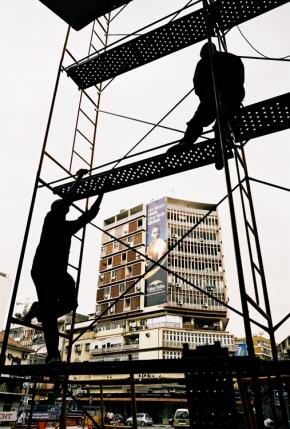
The city wakes and comes to life
It is a white light, the dawn in Luanda. A light that intensifies the browns, greens and ochres of the buildings. From the zinc shacks, a hoarse radio blasts potent songs that compete with the cry of the fare collectors “mutamba-mutamba-airport-airport.” The city only briefly maintains a sleepy serenity, which will become the chaos of traffic and other mambos. Like the people who descend from the peripheral suburbs to the city center, it is a being in movement, a freneticism of waves.
I awake to this immense white light and noise entering violently into the room. I go down to the street and give continuity to the problems that began at home. Escaping from the traffic police and their bizarre arguments, going to work with gusto, buying a wedding gift, taking a dip on the Island, spending an hour on the simplest movement, having to endure the police’s fine-tooth comb, developing exhaustion with the resignation that “this is the life of an Angolan.” I leave the Starlet at the first corner.
In the struggle to catch the candongueiro [passenger vans used as public transportation], it doesn’t matter who came first, or whether they are elderly, female, pregnant, child or disabled, it is the law of shoving. Nobody trusts anyone, relationships are never consolidated, no one ever knows where we were, what is actually the mwadié [“man” or “guy”] vibe, but there is a great deal of joy and freedom… In the tense city, things are for those who are strong. The people taunt and joke with threats: “I’ll beat you! I’ll kill you!”
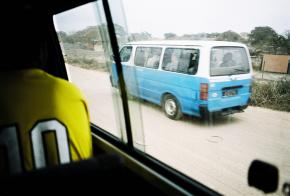 I enter. A hard kuduro is playing: “or kill me or whaaaat!!!” The voice of Dog Murras: we left the mess and now we’ll look. / Don’t talk about gasoline, don’t talk about the war anymore because it’s over / I want to hear my people / where is the house?
I enter. A hard kuduro is playing: “or kill me or whaaaat!!!” The voice of Dog Murras: we left the mess and now we’ll look. / Don’t talk about gasoline, don’t talk about the war anymore because it’s over / I want to hear my people / where is the house?
I walk down streets full of dust with candongueiros lined up to follow the steps. On the outskirts of the Congolese market, the objects, people, information, are many, a sumptuousity dictated by fabrics majestically settled on hips and head. In gestures of eating and dealing with their children. In the way objects circulate in the moving displays and make the spine so straight and the butt so imposing. In the voice and laugh that lingers forever.
A now-technocratic country wakes to its history and confronts continuing ghosts, some still violating the people’s balance. The heirs of this imbalance are an excited youth, laughing and gesturing in a very theatrical retelling of situations that are ‘difficult’, to say the least.
30 is already old, especially when one was born into war. There are no broad horizons, no great stories, only short and hallucinatory ones. We can be here, in the same way as tomorrow we may have already emigrated or disappeared. There is no time for deep thoughts about being alive, the needs are immediate: find a way to survive, work in the permanent reorganization of chaos, make money, enjoy the money. Some with more ambition than others, without frustrations because there are few expectations. All with intensity.
Do not look for Luanda to make adjustments of accounts or articulate realities and desires for life. In a place where one struggles to eat and for a roof over their head, or to charge millions, priorities change, the poor take their revenge, improvisation or cronyism.
Every day a new city is becoming.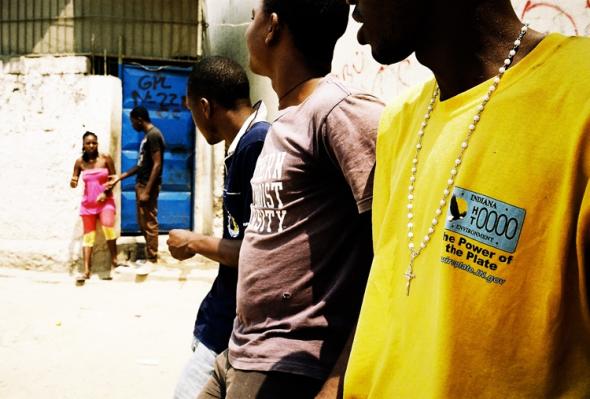
Tired by noon
A lead blue, a light of unsolvable stone. A dip in the middle of the day on the Island to curb the accelerating possibilities. I want to think a little beyond the horizon line. What does life hold for us beyond this? But spirituality is soon cut off by the mayonnaisey food of chic bars along the beach, the tropical environment constructed by caipirinhas in hand, skirts light and colored to match the seafood salad, thrilled with the country’s economic moment.
We are in 2005 and this is a certain Luanda. Those outside have the feeling of always having lost something. Or they prefer to crystallize the image of a certain city: where they were happy, where they suffered greatly. Considering it, however, a city of the present is immediate and easy, but more than that, it is a state of emergency. Because there are cities that, despite their apparent speed, are tired and old, and therefore belong to the past; they make their living in the present from their past, they will look to memory for sustenance in the future. In Luanda there is a transformative and promising part - in which time acts; and there’s a whole country at the bottom that, no matter what regime comes, doesn’t change.
What matters most in this struggle is to be able to reinvent one’s self every day, a laboratory of experiments without mad scientists assuming the tragic consequences. They are not interested in remembering the past - painful - nor in being bound to the lucidity of the future. The solutions and responses must be immediate: circumvent schemes, find new answers. One consumes and lives as if the world ended tomorrow. And it will end, certainly.
The urban landscape changes every second, it is appealing to record everything. This sudden change writes itself on our skin. The people are the reflection of the city’s tensions. It is a tense city of incredibly malleable people.
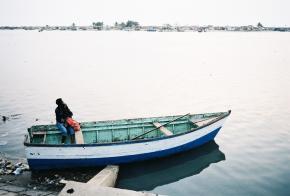 All together and faith in God
All together and faith in God
From tribal and village Africa, fleeing wars, famine and meager living conditions, millions of Africans came to the cities and established themselves there. From the land of immense sanzalas and endless fields, people concentrate themselves on the peripheries, where they can put down their imbambas [things] for a new life. The musseques [slums], like favelas, are not problems, but solutions to fitting one’s life into the monstrous body of the big city; they adapt to it and try to find areas of happiness and secret paths, even in the most Dantesque scenarios.
The solution is part of the problem and turns into a greater problem still.
In the peripheral suburbs of Luanda lives a community spirit, and social networks mitigate the deficiencies. The principle dwellers are gossip among neighbors, caring for the mess of each other’s children, defending the streets and organizing that which no one does for them; they count the pipes on display that have been patched up by various hands, and the electric bypasses for an equal consumption among all.
In the musseques, one lives with a very practical sense, but must also be contemplative and nostalgic of past lives and exodus from the fields.
In Diary of a Bad Year, Coetzee explains that, for generations already born in the urban environment, the city is the undisputed world - the idea of understanding the History of a place with the depth required to see one’s past in palimpsest beneath one’s present is a fallacy. “History has no life unless you give it a home in your consciousness.” Conscience is what exists, what the migrant population transformed in the ruins of the past. Reality is what we make of it, our field of action.
One can close their eyes to more cumbersome realities, but they will come crying for us to hear their brilliance or terror in the middle of the night.

Predators
It is well-known: the Third World is expanding, sophistication is growing in the First and, although they grow separately, they are born in the same space. What is bothersome in this strange camaraderie is to find motives of interest, unlikely combinations and stories for books in almost all environments. The new rich bring behaviors from their humble beginnings, while the poor throw parties where they waste money like the rich. But not everything boils down to a matter of scale, nor the old dichotomies with which society is appreciated, nor is any underworld of this old story so unpalatable, well, sometimes they are.
In rebuilding the country, they oppress the bad events of 30 years of Independence… The long civil war and other atrocities were muted with the silencing of guns, notwithstanding the undoing of suppressing established habits and traumas, or dethroning magnates.
All, without exception, are concentrated in this powerful present.
Some predators arrive possessed by amino acids of opportunities. It is the beginning of a series of projects and businesses, the rules are drawn with which wild capitalism will be mercilessly ingrained. Consolidated peace, will and dynamism, spirit of reconstruction. One invests in the country with economic growth potential, rich in natural resources where no one is out to lose. Antidote against money spent elsewhere on the planet, oil still does not betray the dollar signs and the same pockets are assured a profit. It is time to play the right cards, to pick up niche markets to exploit. Investors, of arms and baggage, put the landscape itself to yield, and trigger development plans where others (or themselves) formerly taught how to aim guns. A model of development pre-purchased in a very unique material: disposable concrete.
Times of enthusiasm in which Angolans say “our riches, our oil, our diamonds, our palace,” even if nothing changes in the life of the overwhelming majority. Times in which the most unusual characters keep arriving - land that has always attracted adventurers. The multilingualism grows in the babel of bisness - Portuguese in its various accents, a lot of Mandarin, the Hindi of trade, Arabic, some Hebrew, English for meetings and technology, Spanish of the NGOs, Umbundu and Kimbundu of the backyards and tradeswomen, Lingala of stylish Zaireans, French of oil and cultural life, and some Russian left over for bleach-whites on the beaches of the Island.
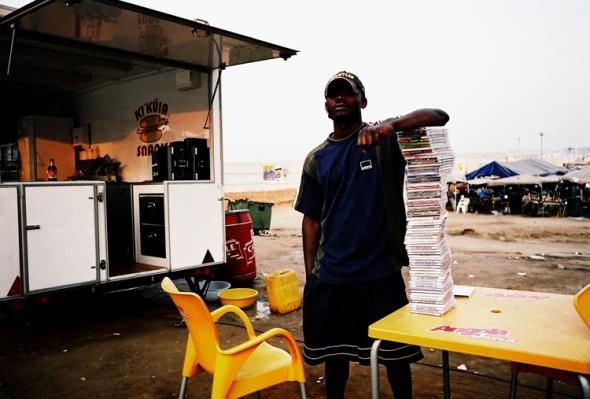 The economy opens up, tolerant to international relations in dialogue with former enemy powers. If, until 1993, the U.S. supported UNITA and attemped by any means to divide Angola, they are now allies with whoever will maintain a dialogue of strategic partnership on low heat, which would strengthen under Obama. It is the same with South Africa. Nothing of previous hatreds; the ability to overcome conflicts and tensions is a gift of the Angolan people.
The economy opens up, tolerant to international relations in dialogue with former enemy powers. If, until 1993, the U.S. supported UNITA and attemped by any means to divide Angola, they are now allies with whoever will maintain a dialogue of strategic partnership on low heat, which would strengthen under Obama. It is the same with South Africa. Nothing of previous hatreds; the ability to overcome conflicts and tensions is a gift of the Angolan people.
The system could shake but does not fall, because the same elites are in power with new terms and speeches that have no problem keeping up with the spectacularization of politics happening on a global level. Those who know how to lie well are all in the same family!
Luanda is a city of rapid growth, say those who give names to these phenomena of the pulse of life and business; they raise buildings, new condos, banks, offices and hotels, and towers take the place of the bay breeze. We lost the ventilation.
The nationalist accolades take shape in an Angola that waddles in the World Cup - we yelled in a chorus and danced when the goal was scored! - And prepared for the elections.
If there is a slowdown in the economy, the motto will continue to be: “Always Rising!” because what matters is the world seeing Angola becoming, that what happens is seen out there, even if what needs to be done within is neglected.
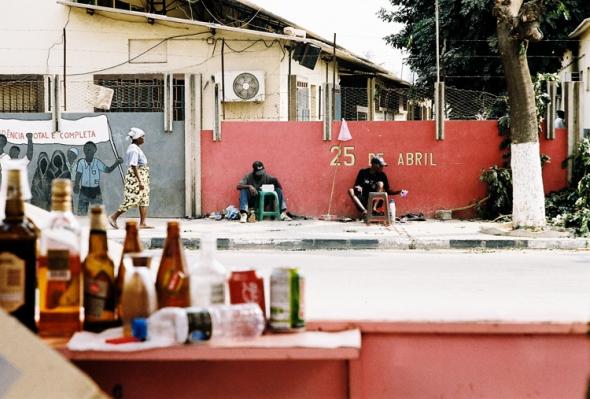
The gossips. How to inhabit the city
Some are suspicious. An Angolan who barely leaves the house describes Luanda like this: “the city rests on two things: sewage and oil. The country is twelve million thinking statues (fear, intimidation, subordination) at the base of a few generals or powerful others, and on top of the pyramid is the big shark.”
Every one uses their metaphors to try to describe what messes with them - they also say, “this is the Dubai of Africa.” They risk comparisons to find a proper model. What you see on the streets is a constant struggle, movement, noisy cars and gestures of some undecided passersby, in contrast with the bearings of zungueiras [informal street vendors] that - with bowls on their heads and multifunctional cloths to carry children, impose divisions, cover to escape the tax collectors - seem to serve in the spirit of a perfect mission: finding what (there is) to eat today. It is the great battle of business, the realm of the “informal economy”, social scientists say.
The city is an immense public square where the priority is living and eating alone is inconceivable. A culture of exhibition where everything is played out in life. Showing money, showing need: the bilos [fights] on the street, war, power, sex life, the world of glamour. Forms of affirmation in which the ego is called upon to distance itself, every Angolan has their own singular form of banga [vanity] - “they have to feel us!!!” - And then they will have garages for five cars, buying a unique piece of haute couture, spending $5,000 in a night, buying a diamond ring to offer, in a chorus, to the lady, building fantasy towns like Talatona, unrealistic speeches, awards, gallons of honor, heroicizing dead who no longer bother them.
One also lives within, in respective clans, in the gaping social divisions between houses behind high, barbed walls; comfort measured at inflated prices, private condominiums to hide the discomfort which even then may not have running water (and always the generator first), the lack of parks for walking, sidewalks to use. And the niggling powder that intrudes on our feet, rising up until we are covered in a film of dust that is drowned every day in the plumbing.
Simulation comes from ancient times. In Luaandando, Pepetela recounts that 1730 was the year of rain that had never before lasted so long, complete with general infections, smallpox and scurvy. All this plus the stench; it was necessary to disguise it. Anyone that could, made their home a bunker in the surrounding environment. Today, cable TV has the same function; it helps the whole world to inhabit this country, without having to take in the harsh reality of the neighborhoods next door. It is just next door.
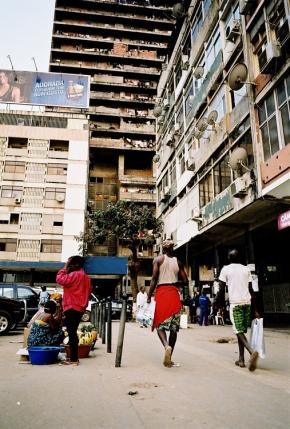 Homecoming and the promise of travel
Homecoming and the promise of travel
The nocturnal places of desolation where Bob Marley’s voice is heard as hope recovered a thousand times, among the yellow walls with naprons [decorative embroidered cloth] and two girls with eyes stuck to the soap opera at a volume that owes it all to noise laws.
In the shacks of Chicala, while we exaltedly eat cuttlefish and cacusso, one might lament the state of the country - but always laughing and with beers coming faster than thought - a prostitute arrives with breasts almost visible, singing a song of the pain of love. One suffers greatly from love in Luanda.
Returning home, the endless climb in the obscurity of the stairs, an extension of private life, where things can happen on every level: girls braid hair, chickens are decapitated, barbecues, laundry, playing children who come into your house, teenage lovers caught red-handed, private conversations and cuddling, music and exchange of views on the neighborhood’s gang, community meetings. Housekeepers cook up the latest gossip. Husbands leave early and come back tired, at late hours, from homes of lovers or from drinking. The elevator car, which was a trash can, can also serve as a small house.
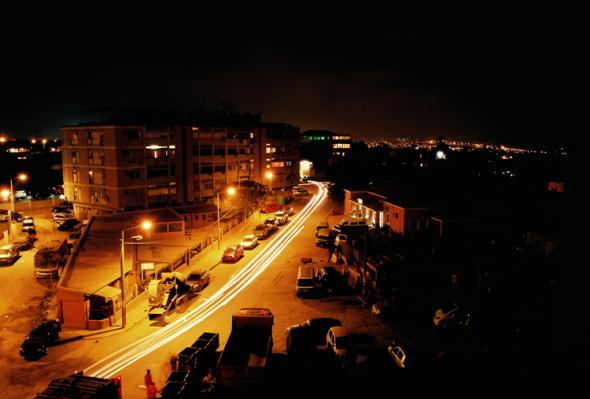
The power fails so often that beer must be drunk quickly so it doesn’t become warm. Sleeping is a fight with attacks of malarial mosquitoes. Fatigue invades us and, in Luanda’s tall buildings, one experiences an enthusiasm that is sometimes wonderful. Laughing and dancing are still infallible reserves for survival. The chants echo from the rum, beer, cannabis and the promise of the provinces. We have to leave by these roads, to understand the country prohibited for so many years.
In this exaltation, we still believe that they will not transform Luanda into a bisnesscenter.
We are able to love the turbulent city, despite the helplessness in which people live, of the harmful tumor that does not improve anyone’s life. We comfort ourselves in focal points of resistance against the predatory state. And what is most resistant is the warm side, the familiar people, great complicities, seeming that we have always been here, the ability to believe. Because our Luanda does not lack for stories to tell and for this the city has to live up to its citizens.
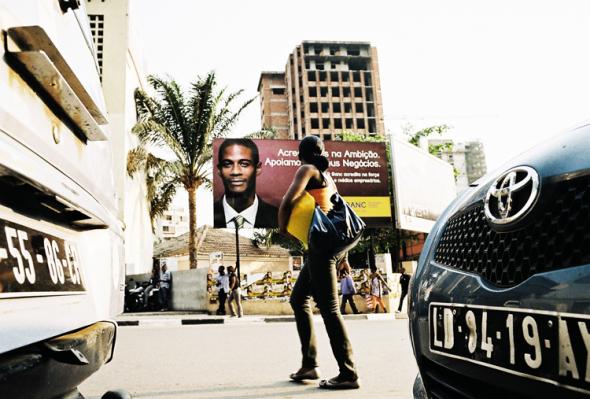 All this is just an oversimplification of the picture. What was surprise and enigma, and almost dangerous for strangers, is now, only and happily, a city with its particularities, with things that are joyous and exhausting at the same time. It remains to been seen if living here is a potion for youth or the strongest poison for rapid aging. We move between attraction and repulsion, like everything alive, explosive and intense.
All this is just an oversimplification of the picture. What was surprise and enigma, and almost dangerous for strangers, is now, only and happily, a city with its particularities, with things that are joyous and exhausting at the same time. It remains to been seen if living here is a potion for youth or the strongest poison for rapid aging. We move between attraction and repulsion, like everything alive, explosive and intense.
The clear, sweet, and serene blue of the bay will not let me glimpse the same city I have just described, that which shakes, agitates, rebels, gestures and vomits on itself, and then crosses its arms in resignation.
Do what? They are the problems that we have.
Luanda, 2005